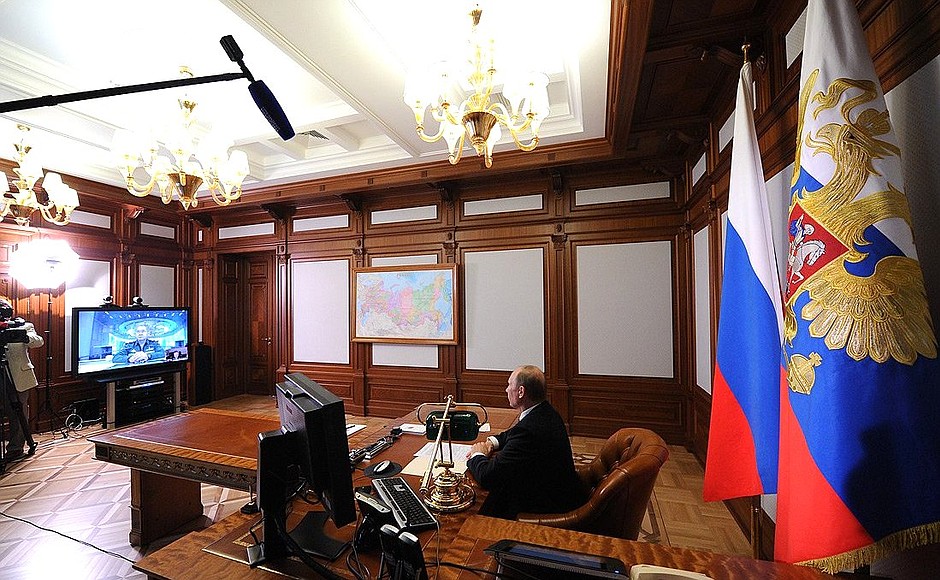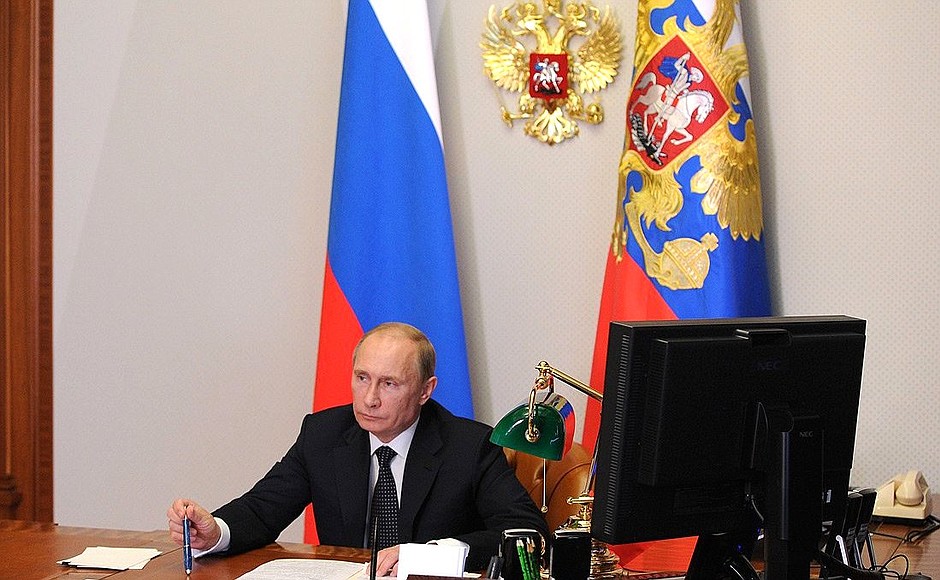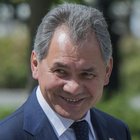The President announced this during a videoconference with Defence Ministry heads.
Mr Putin said that particular emphasis must be on coordination and exchange of information between the federal executive authorities and the various agencies involved in the inspections.
The President gave instructions to have subordinate agencies carry out mobilisation tasks for the Armed Forces’ needs and ensure technical protection for railway traffic and troop movement routes. Mr Putin also said that particular attention must be paid to guaranteeing energy security and deploying the command system.
Before the meeting, Mr Putin was briefed by Defence Minister Sergei Shoigu on the fire-fighting operation on the Tomsk submarine, which is currently undergoing repair work, and heard a report from Admiral Vladimir Korolev, commander of the Northern Fleet, on work to deploy a military base on the New Siberian Islands.
* * *
President of Russia Vladimir Putin: Good afternoon, colleagues,
Mr Shoigu, can you hear me clearly?
Defence Minister Sergei Shoigu: Yes, Mr President. Good afternoon.
Vladimir Putin: Good afternoon.
Before turning to the main subject on our agenda, I’d like to hear from the Defence Minister on the fire-fighting operations on board the submarine currently undergoing repairs in the Far East. Mr Shoigu, can you tell us what exactly happened there?
Sergei Shoigu: A fire broke out at 4.30 am Moscow time on the K-150 Tomsk submarine, not inside the vessel itself – it was the outer casing that caught fire. The preliminary investigation suggests that the fire was caused by safety violations during welding work.
The submarine was put in the Zvezda shipyard’s dock for repairs in 2009. At the same time, all the vessel’s weapons were removed. With regard to the submarine’s power reactor, all necessary action has been taken and the reactor was flooded with all the absorbents used in such cases. As at 1.15 pm Moscow time, the fire-fighting operations were all completed.
Plans are now being examined for carrying out ventilation of the eighth compartment. What is important is that the fire has not damaged the submarine’s actual equipment. Two technical openings were cut in the vessel. Nine teams from the Pacific Fleet’s 703rd base and four Emergency Situations Ministry fire-fighting teams took part in the operation.
Mr President, my first request is for stricter control and supervision at the shipyard itself, stricter control over how this kind of work is carried out.
My second request is that we would of course like to receive a statement from the company carrying out the repair work that this incident will not affect the repair work deadlines in any way and that we will get the submarine back and ready to go on combat duty as planned.
That ends my report.
Vladimir Putin: Good, thank you.
We will take the needed steps on the industrial side, and the government agencies will carry out their relevant work too. All of you will then report separately on the situation and on what needs to be done to settle this particular incident completely. Of course, we also need to look at how to make sure there are no repeats of this kind of situation. This is not the first such case after all.
I would now like to hear from Commander of the Northern Fleet Admiral Korolev on the work to carry out my instruction to establish a military base on the New Siberian Islands. Our military left the islands in 1993, but this is an important spot in the Arctic Ocean, in terms of developing and opening up the Northern Sea Route too.
We agreed that we would not only restore the military base on the islands, but would also repair the airfield and make it possible for people from the Emergency Situations Ministry, hydrologists and climatologists to work there too, so as to ensure safe and effective operation of the Northern Sea Route and Russia’s effective control over this part of its territory.
(Admiral Vladimir Korolev then briefed the President on the work to set up the base on the New Siberian Islands, rebuild the airfield, and plans to build a stationary dock on Kotelny Island that would handle barges and ships).
Vladimir Putin: This is a big undertaking. Three battleships, seven supply vessels and four nuclear-powered icebreakers are a big group. It’s a good and successful start. I wish you just as successful a completion of this stage of the work, and I ask the Defence Ministry to keep me updated on the work. Thank you very much.
Let’s discuss now the main subject on our agenda today. The Defence Ministry is in the middle of active preparation for the joint Zapad-2013 strategic training exercise with the Republic of Belarus. We plan to use test grounds in Belarus, Kaliningrad Region, and our Baltic Sea waters for practical troop operations.
I know that the troops in the Western Military District are busy right now putting their units on top-level combat readiness and are actively working out the details of moving the troops by rail and getting them to the test grounds for carrying out their missions.
The Defence Ministry has already carried out several snap inspections this year and held related exercises in all of the military districts. The results show that these kinds of snap exercises are definitely useful and very effective. Given that these kinds of comprehensive snap inspections have proved effective, we have decided to continue the practice and expand it somewhat.
This time, at the same time as the armed forces’ preparations for the Zapad-2013 exercises, comprehensive inspections will take place in Interior Ministry units and in several civilian agencies: the Transport and Energy Ministries, and the Nizhny Novgorod regional administration.
In this respect, I instruct the ministries and agencies concerned and the Governor of Nizhny Novgorod Region to inform all of the subordinate units concerned that they must be fully ready for taking part in exercises by 10 am Moscow time on September 17. I stress that this is just an exercise situation. There is no emergency situation in the country and I hope never will be. But to ensure that we never do end up facing such situations, we need to hold training exercises. You will receive the written instructions today.
During the first days, I want you to check the relevant agencies’ fulfilment of the time norms and their ability to perform their missions at this readiness level.
You should pay particular attention to coordination and information exchange between the federal executive authorities and all of the organisations taking part, and also pay attention to coordination on mobilisation issues with the military command structures and military service and mobilisation officials.
I also ask you to test the situation in the following areas.
First, the subordinate agencies’ ability to carry out mobilisation tasks for the armed forces.
Second, providing technical protection for railway transport and troop movement routes.
Third, ensuring energy security and command systems deployment.
Performance in carrying out civil and territorial defence measures is also important.
I hope that this inspection will enable us to assess the level of coordination between the ministries and agencies and check the state of inter-ministerial planning. It will help us to develop mechanisms for responding to potential major threats.
I ask you to report on the missions’ implementation according to the usual procedures.
Mr Shoigu, I give you the floor for your report.
Sergei Shoigu: Thank you, Mr President.
Carrying out the tasks the President has set makes coordination between our ministries and agencies essential. The exercises will be carried out in conjunction with preparations for the Zapad-2013 exercises. The Defence Ministry will set up an operations group headed by First Deputy Defence Minister Army General Bakhin, and the Chief of Armed Forces General Staff will include in that group the heads of the command bodies in order to ensure direct coordination with the ministries and agencies.
In accordance with the President’s instructions, this joint work will begin at 10 am tomorrow. We have received written instructions from the President. I ask that these instructions be sent to the ministries and agencies concerned, and to the Nizhny Novgorod regional authorities. By 10 am tomorrow the Defence Ministry will have drafted proposals for the tasks that require joint planning.
Mr President, allow me to begin carrying out the set missions.
Vladimir Putin: Are they listening to us right now in Nizhny Novgorod Region and the relevant ministries?
Sergei Shoigu: Yes, they’re with us, the linkup is in place.
Vladimir Putin: Nizhny Novgorod Region, go ahead please.
Vladimir Ivanov: Good afternoon Mr President, it’s Deputy Governor of Nizhny Novgorod Region Vladimir Ivanov here.
Vladimir Putin: Yes, Mr Ivanov, the main question is, do you understand the task?
Vladimir Ivanov: We understand the task. We will receive our instructions and carry them out of course.
Vladimir Putin: Thank you. Will you manage without the governor?
Vladimir Ivanov: We won’t let you down.
Vladimir Putin: Good.
Are the Transport Ministry and the Energy Ministry with us?
Energy Minister Alexander Novak: Good afternoon.
We understand the task. We will start working on your instruction today, in cooperation with the Defence Ministry. We have just received the relevant instructions.
Vladimir Putin: And the Transport Ministry?
Alexei Tsydenov: Mr President, it’s Deputy Transport Minister Tsydenov here. We understand the task and will begin work.
Vladimir Putin: Good. With regard to civilian agencies, report to the Prime Minister on the situation. Mr Medvedev knows about today’s event, but given that the plans will necessitate some adjustments to the ministries’ work, report to the Prime Minister on the situation.
Thank you. Let’s get down to work. Good luck.


